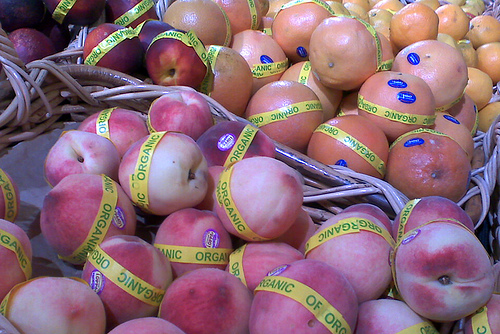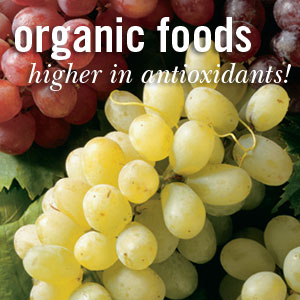What is Organic Food? Wilkipedia defines it as Foods that are produced using methods that do not involve modern synthetic inputs such as synthetic pesticides and chemical fertilizers, do not contain genetically modified organisms, and are not processed using irradiation, industrial solvents, or chemical food additives.
This definition leaves a lot of leeway on how to grow things ‘organically’. If you walk into a grocery store and see the label Organic it can be somewhat of a disillusion as to how it was grown. From the definition it might sound like a plant grown naturally, without the use of pesticides, fertilizers and GM seeds. However, ‘Organic’ doesn’t prohibit the use of those, only limits the options of what you can use. Most ‘Organically’ grown food is grown with the use of pesticides, herbicides and fungicides, the difference is that they are ‘naturally’ derived not synthetically made. I say ‘naturally’ because some could argue about how ‘natural’ it is when you subtract it and use it in high concentrations. At this point you could ask the question how is it any better? Organic farmers can still use hybrid seeds, pesticides, herbicides and fungicides. Why grow it this way if you are going to call it ‘Organic’? Easier: marketing and money. The label ‘Organic’ drives the price very high, resulting in food sold for even twice as much as other food.
Is ‘Organic’ really any better? It seems that we still have to use pesticides, herbicides, and fungicides, we still use hybrid seeds. So is there any real difference? If you look at the ‘Organic’ agriculture you will see that the difference is probably not huge, some even argue that ‘Organic’ farms use more pesticides on their crops. Potatoes and apples for instance, grown Organically use lots of herbicides, pesticides and fungicides. However, if you look at the crops on a whole, only 2-3% use poison control. The preferred method by many is the use of insects which prey upon bugs damaging the plants.
But still, why should we go Organic? We still have to use some form of protection in the form of poisons or expensive insects, don’t we? Well, we do live in a fallen world. The curse is on everything, from the rose on the bush to the tall strong oak. We don’t have perfect soil or plants any more. However, through the use of good organic practices we can obtain some form of agriculture method that can result in a pesticide free, herbicide free, fungicide free farming.
How can this be done? First of all let me tell you what good organic farming looks like. Tilling is something that man has done for centuries, and yet, is it really necessary? In fact it is not necessary. Look around you, in the forest. What do you find there? First you find a layer, of dead leaves and branches that form a thick mulch not allowing many weeds to penetrate into the soil in which to grow and become a ‘nuisance’.
Second, if you dig underneath the mulch you will find a loose, friable, airy soil, that smells clean. How does it become like this? This is the result of the decomposition of leaves being pulled under by earthworms and being composted by bacteria.
Thirdly you will find soil that is not overly dry or wet. The mulch on top displaces the water when there is too much, and holds in water until it is full, like a sponge. Do the trees ever get watered except by rain? Do the trees get fertilized, except from the composting of the dead leaves and droppings of animals? Do the trees need a herbicide to keep down weeds? Or pesticides or fungicides? The answer is no. Generally you find healthy plants growing by themselves without our help.
How can we take this and put it into our farming methods? Composting and mulch are the two answers. The use of good compost will do several things. Compost holds much more water than soil does, resulting in less watering. It also provides nutrients from the decomposed matter as well as a soil that is light, airy and rich.
Mulching does several things as well. The first thing it does is it provides a barrier between the soil and the rain and sun. This keeps the soil from drying out and getting packed down. Second if you are using a mulch such as wood chips, the outer surface of the mulch is dry and seeds will not germinate on it, meaning weeds are no longer a problem. Thirdly it holds in lots of water as well as breaking down into compost while on the soil.
Okay, so you have a good soil that holds water and doesn’t require buying fertilizer. But don’t you still need to use some sort of pest control? Well, let’s first address the reason why bugs eat plants? Bugs eat plants to live, but the interesting thing is they eat plants that are unhealthy. Deficient in a nutrient or under stress. So now our goal is no longer to keep bugs from eating the plants, but to figure out the problem with the soil and fix it. We are no longer trying to cover up the wound, but trying to clean it out and fix the problem. Once we have a soil that is airy, rich in nutrients, holds water, and doesn’t have weed problems our plant can grow healthy and strong, and a strong plant can withstand a lot.
We now have a strong healthy soil that will produce healthy plants. Work is minimal, cost is minimal and the return is very rewarding! With a method like this the yield is higher than conventional and the food is healthier! I believe under the right system, Organic Farming can result in higher yields and a sustainable growing system that will support us for much longer than conventional farming methods. I believe that despite the curse, God’s creation shows a good example of what good farming methods look like, look to God and see what he has made and learn from Him.
English Vintner


